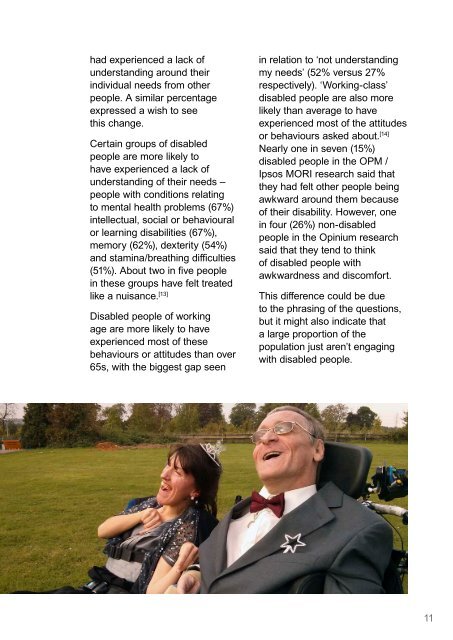Current attitudes towards disabled people
Current-attitudes-towards-disabled-people.pdf?ext=
Current-attitudes-towards-disabled-people.pdf?ext=
Create successful ePaper yourself
Turn your PDF publications into a flip-book with our unique Google optimized e-Paper software.
had experienced a lack of<br />
understanding around their<br />
individual needs from other<br />
<strong>people</strong>. A similar percentage<br />
expressed a wish to see<br />
this change.<br />
Certain groups of <strong>disabled</strong><br />
<strong>people</strong> are more likely to<br />
have experienced a lack of<br />
understanding of their needs –<br />
<strong>people</strong> with conditions relating<br />
to mental health problems (67%)<br />
intellectual, social or behavioural<br />
or learning disabilities (67%),<br />
memory (62%), dexterity (54%)<br />
and stamina/breathing difficulties<br />
(51%). About two in five <strong>people</strong><br />
in these groups have felt treated<br />
like a nuisance. [13]<br />
Disabled <strong>people</strong> of working<br />
age are more likely to have<br />
experienced most of these<br />
behaviours or <strong>attitudes</strong> than over<br />
65s, with the biggest gap seen<br />
in relation to ‘not understanding<br />
my needs’ (52% versus 27%<br />
respectively). ‘Working-class’<br />
<strong>disabled</strong> <strong>people</strong> are also more<br />
likely than average to have<br />
experienced most of the <strong>attitudes</strong><br />
or behaviours asked about. [14]<br />
Nearly one in seven (15%)<br />
<strong>disabled</strong> <strong>people</strong> in the OPM /<br />
Ipsos MORI research said that<br />
they had felt other <strong>people</strong> being<br />
awkward around them because<br />
of their disability. However, one<br />
in four (26%) non-<strong>disabled</strong><br />
<strong>people</strong> in the Opinium research<br />
said that they tend to think<br />
of <strong>disabled</strong> <strong>people</strong> with<br />
awkwardness and discomfort.<br />
This difference could be due<br />
to the phrasing of the questions,<br />
but it might also indicate that<br />
a large proportion of the<br />
population just aren’t engaging<br />
with <strong>disabled</strong> <strong>people</strong>.<br />
11


